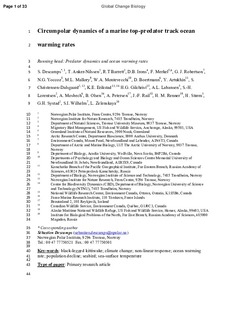| dc.contributor.author | Descamps, Sebastian | |
| dc.contributor.author | Anker-Nilssen, Tycho | |
| dc.contributor.author | Barrett, Robert T | |
| dc.contributor.author | Irons, D | |
| dc.contributor.author | Merkel, Flemming | |
| dc.contributor.author | Robertson, Gregory J. | |
| dc.contributor.author | Yoccoz, Nigel Gilles | |
| dc.contributor.author | Mallory, Mark L | |
| dc.contributor.author | Montevecchi, William A. | |
| dc.contributor.author | Boertmann, D. | |
| dc.contributor.author | Artukhin, Yuri | |
| dc.contributor.author | Christensen-Dalsgaard, Signe | |
| dc.contributor.author | Erikstad, Kjell E | |
| dc.contributor.author | Gilchrist, H. Grant | |
| dc.contributor.author | Labansen, Aili | |
| dc.contributor.author | Lorentsen, Svein Håkon | |
| dc.contributor.author | Mosbech, Anders | |
| dc.contributor.author | Olsen, Bergur | |
| dc.contributor.author | Petersen, Aevar | |
| dc.contributor.author | Rail, Jean-Francois | |
| dc.contributor.author | Renner, Heather M. | |
| dc.contributor.author | Strøm, H. | |
| dc.contributor.author | Systad, Geir Helge | |
| dc.contributor.author | Wilhelm, Sabina I. | |
| dc.contributor.author | Zelenskaya, Larisa | |
| dc.date.accessioned | 2017-11-10T13:47:21Z | |
| dc.date.available | 2017-11-10T13:47:21Z | |
| dc.date.created | 2017-05-10T10:55:08Z | |
| dc.date.issued | 2017 | |
| dc.identifier.citation | Global Change Biology. 2017, . | nb_NO |
| dc.identifier.issn | 1354-1013 | |
| dc.identifier.uri | http://hdl.handle.net/11250/2465586 | |
| dc.description.abstract | Global warming is a nonlinear process, and temperature may increase in a stepwise manner. Periods of abrupt warming can trigger persistent changes in the state of ecosystems, also called regime shifts. The responses of organisms to abrupt warming and associated regime shifts can be unlike responses to periods of slow or moderate change. Understanding of nonlinearity in the biological responses to climate warming is needed to assess the consequences of ongoing climate change. Here, we demonstrate that the population dynamics of a long-lived, wide-ranging marine predator are associated with changes in the rate of ocean warming. Data from 556 colonies of black-legged kittiwakes Rissa tridactyla distributed throughout its breeding range revealed that an abrupt warming of sea-surface temperature in the 1990s coincided with steep kittiwake population decline. Periods of moderate warming in sea temperatures did not seem to affect kittiwake dynamics. The rapid warming observed in the 1990s may have driven large-scale, circumpolar marine ecosystem shifts that strongly affected kittiwakes through bottom-up effects. Our study sheds light on the nonlinear response of a circumpolar seabird to large-scale changes in oceanographic conditions and indicates that marine top predators may be more sensitive to the rate of ocean warming rather than to warming itself. | nb_NO |
| dc.language.iso | eng | nb_NO |
| dc.title | Circumpolar dynamics of a marine top-predator track ocean warming rates. | nb_NO |
| dc.type | Journal article | nb_NO |
| dc.type | Peer reviewed | nb_NO |
| dc.description.version | acceptedVersion | nb_NO |
| dc.subject.nsi | VDP::Matematikk og Naturvitenskap: 400::Zoologiske og botaniske fag: 480 | nb_NO |
| dc.source.pagenumber | 11 | nb_NO |
| dc.source.journal | Global Change Biology | nb_NO |
| dc.identifier.doi | 10.1111/gcb.13715 | |
| dc.identifier.cristin | 1469286 | |
| cristin.unitcode | 7511,2,0,0 | |
| cristin.unitcode | 7511,4,0,0 | |
| cristin.unitname | Avdeling for terrestrisk økologi | |
| cristin.unitname | Tromsø | |
| cristin.ispublished | true | |
| cristin.fulltext | postprint | |
| cristin.qualitycode | 2 | |
